
Pathologie
Scope & Guideline
Empowering Researchers in the Dynamic Field of Pathology
Introduction
Aims and Scopes
- Histopathological and Molecular Diagnostics:
The journal focuses on advancements in histopathological techniques and molecular diagnostics, including the identification of biomarkers and the classification of various tumors, which are crucial for accurate diagnosis and personalized treatment. - Reports and Guidelines from Professional Societies:
Regular reports from working groups of professional societies are a key feature, providing updates on standards, classifications, and best practices in pathology, enhancing the quality of care in pathology services. - Interdisciplinary Collaboration:
The journal promotes interdisciplinary approaches in pathology, encouraging collaboration between pathologists, oncologists, and other medical professionals to improve diagnosis and treatment outcomes. - Digital Pathology and AI Integration:
A significant focus on digital pathology and the integration of artificial intelligence in diagnostic processes reflects the journal's commitment to exploring innovative methodologies that enhance diagnostic accuracy and efficiency. - Pediatric and Fetal Pathology:
The journal addresses specialized areas such as pediatric and fetal pathology, highlighting the unique challenges and advancements in diagnosing and managing conditions in these sensitive populations.
Trending and Emerging
- Artificial Intelligence and Machine Learning:
There is a growing emphasis on the application of artificial intelligence and machine learning in pathology diagnostics, showcasing the potential for these technologies to enhance diagnostic accuracy and efficiency. - Molecular Pathology and Biomarkers:
Recent publications increasingly focus on molecular pathology and the identification of biomarkers, underscoring the importance of personalized medicine and targeted therapies in cancer treatment. - Digital Pathology and Telepathology:
The rise of digital pathology and telepathology is gaining attention, particularly in the context of remote diagnostics and the integration of digital tools to streamline pathology workflows. - Pediatric and Rare Tumor Pathology:
There is an emerging focus on pediatric and rare tumor pathology, reflecting a commitment to understanding the unique characteristics and challenges associated with diagnosing and treating these conditions. - Ethics and History of Pathology:
Topics related to the ethics and historical perspectives of pathology are becoming more prominent, indicating a recognition of the importance of these areas in shaping modern pathology practices.
Declining or Waning
- Traditional Histological Techniques:
There has been a noticeable decline in papers focused solely on traditional histological techniques as the field moves towards more advanced molecular and digital pathology methods. - General Reviews Without Novel Insights:
Papers that offer general reviews without introducing new data, insights, or methodologies are becoming less frequent, indicating a shift towards more original research and innovative contributions. - Non-Specialized Tumor Pathology:
The publication of non-specialized papers on tumor pathology, which do not address specific advancements or unique cases, seems to be decreasing, as the journal prioritizes more focused and specialized content.
Similar Journals

PATHOLOGICA
Pioneering Knowledge in Pathology and Forensic Medicine.PATHOLOGICA is a leading academic journal dedicated to the field of pathology and forensic medicine, published by PACINI EDITORE. With a rich history dating back to its inception in 1945, the journal has consistently contributed to the advancement of knowledge in these vital areas of medical research and practice. Currently ranked in the Q1 quartile for Pathology and Forensic Medicine and holding an impressive position as #42 out of 208 in the Scopus rankings, it reflects a significant impact within the academic community, boasting an 80th percentile ranking. The journal is committed to publishing high-quality, peer-reviewed articles that explore innovative research findings and clinical advancements, making it an essential resource for researchers, clinicians, and students alike. Though it does not offer open access, PATHOLOGICA continues to foster scholarly communication by disseminating cutting-edge research findings, thus playing a pivotal role in enhancing pathology education and practice worldwide.
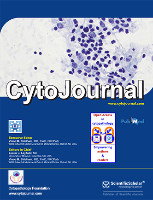
CytoJournal
Pioneering Open Access to Transformative Medical Discoveries.CytoJournal is a leading open-access journal focused on the fields of pathology and forensic medicine, published by SCIENTIFIC SCHOLAR LLC. With its esteemed reputation, the journal has achieved a Q2 ranking in the 2023 Category Quartiles in its field, indicating its significant contribution and impact among its peers. Over its convergence from 2004 to 2024, CytoJournal has established itself as a pivotal platform for researchers, professionals, and students to disseminate and exchange pioneering research findings related to cytopathology and diagnostic techniques. With an emerging Scopus rank of #115 out of 208 in the field, the journal maintains a solid percentile ranking of 44th, underlining its importance in the scientific community. CytoJournal's commitment to facilitating open access ensures that critical insights and advancements in pathology and forensic medicine are easily accessible to those at the forefront of this essential area of study.
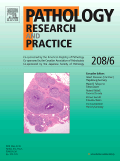
PATHOLOGY RESEARCH AND PRACTICE
Advancing the Frontiers of Pathological SciencePATHOLOGY RESEARCH AND PRACTICE is a premier journal in the field of pathology and forensic medicine, published by Elsevier GmbH in Germany. With a rich publication history since 1978 and an impressive convergence period extending to 2024, this journal serves as a vital resource for researchers and professionals dedicated to advancing the understanding of pathological processes. It holds notable rankings, including Q3 in Cell Biology and Q2 in Pathology and Forensic Medicine for 2023, reflecting its significance in the academic community. The journal aims to publish innovative research findings, reviews, and case studies, facilitating a deeper understanding of disease mechanisms and improving diagnostic practices. Authors and readers alike benefit from its reputable platform, noted for its challenging and rigorous peer-review process. By fostering a collaborative environment and providing open access options, PATHOLOGY RESEARCH AND PRACTICE continues to contribute meaningfully to the discourse within its respective fields, thereby appealing to a diverse audience of researchers, professionals, and students.
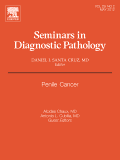
SEMINARS IN DIAGNOSTIC PATHOLOGY
Leading the way in pathology innovation.Seminars in Diagnostic Pathology is a premier journal that has established itself as an essential resource in the field of pathology since its inception in 1984. Published by W B Saunders Co-Elsevier Inc, this journal boasts an impressive Q1 ranking in the pathology category for 2023, placing it in the top tier of medical journals worldwide. With a focus on diagnostic pathology, it offers a platform for groundbreaking research and advancements that bridge the gap between basic science and clinical practice. The journal is committed to publishing high-quality review articles, case reports, and expert opinions that provide valuable insights for professionals, researchers, and students alike. Although it operates on a subscription model, the journal's extensive impact is reflected in its Scopus rank (#56/208), with a remarkable 73rd percentile standing in the pathology and forensic medicine category. The journal's authoritative content not only aids in enhancing knowledge but also fosters an understanding of the evolving challenges and methodologies in diagnostic pathology, making it an indispensable tool for anyone dedicated to excellence in the field.
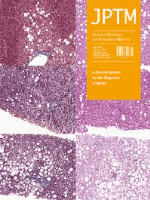
Journal of Pathology and Translational Medicine
Championing Open Access in Pathology ResearchThe Journal of Pathology and Translational Medicine, published by the Korean Society of Pathologists, is a distinguished peer-reviewed Open Access journal that has been at the forefront of advancing the field of pathology and histology since its inception in 1985. With an established ISSN of 2383-7837 and an E-ISSN of 2383-7845, the journal serves as a vital platform for disseminating high-quality research, fostering collaboration among professionals and offering valuable insights into both clinical applications and theoretical advancements. Recognized for its influence in the field, it holds a commendable Q2 ranking in both Histology and Pathology & Forensic Medicine categories in 2023, and ranks #52/208 in Scopus for Medicine – Pathology and Forensic Medicine, demonstrating its impact and reach within the academic community. Located in South Korea at 1209 Gwanghwamun Officia, 92 Saemunan-ro, Jongno-gu, Seoul 03186, this journal not only caters to researchers and professionals but also supports students striving to deepen their understanding of pathology. Join the growing body of knowledge and stay updated with the latest findings in this essential field of study through the journal's open access format, promoting worldwide accessibility and engagement.
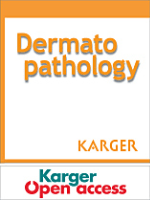
Dermatopathology
Enhancing clinical practices with cutting-edge insights.Dermatopathology is a pioneering open-access journal dedicated to the field of skin pathology, published by MDPI in Basel, Switzerland. Since its inception in 2014, the journal has provided a vital platform for the dissemination of cutting-edge research, advancements, and clinical studies that aid in the understanding of dermatological diseases at the microscopic level. With its commitment to accessibility and wide-ranging contributions from international researchers, Dermatopathology serves as an essential resource for dermatologists, pathologists, and academics alike. The journal strives to foster innovative collaborations and enhance knowledge within the multidisciplinary sphere of dermatology and pathology, ensuring timely access to valuable information that can influence clinical practices and improve patient outcomes. Researchers are encouraged to submit their original articles, case reports, and reviews, contributing to the growing body of knowledge essential for advancing the field.
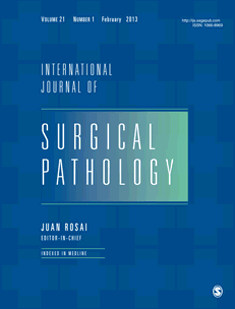
INTERNATIONAL JOURNAL OF SURGICAL PATHOLOGY
Unveiling Insights in Anatomy and SurgeryInternational Journal of Surgical Pathology is a distinguished peer-reviewed journal published by SAGE Publications Inc since 1993, specializing in the intricate fields of surgical pathology, anatomy, and surgery. With an ISSN of 1066-8969 and an E-ISSN of 1940-2465, this journal has been at the forefront of disseminating vital research that helps shape clinical practices and understanding in surgical diagnostics. Ranked in the Q2 category for Anatomy and garnering Q3 status in Pathology and Forensic Medicine as well as Surgery, the journal holds a commendable position within its field as reflected by its Scopus ranks. The impact factor underscores its influence and relevance, making it an essential resource for researchers, professionals, and students alike, looking to stay abreast of advancements in surgical pathology. However, please note that the journal does not currently offer open access options. As it converges through the years from 1993 to 2024, the International Journal of Surgical Pathology continues to uphold its commitment to excellence in medical research.

AJSP-Reviews and Reports
Driving Understanding in Diagnostic PracticesAJSP-Reviews and Reports is a peer-reviewed journal dedicated to the advancement of knowledge within the field of pathology and forensic medicine. Published by the renowned Lippincott Williams & Wilkins, this journal plays a vital role in disseminating insightful reviews and reports that contribute to the understanding and application of diagnostic practices and forensic investigations. While currently listed in the fourth quartile (Q4) within its category according to the 2023 metrics, the journal is committed to enhancing its impact and fostering scholarly dialogue among researchers, professionals, and students in the medical community. Despite challenges in Scopus rankings, it provides a platform for significant discourse and innovation in pathology. Operating from the United Kingdom, AJSP-Reviews and Reports is positioned to bridge gaps in knowledge and inspire future research developments. Readers can access valuable findings without open access barriers, allowing for efficient information sharing within the medical field.

Oral & Maxillofacial Pathology Journal
Empowering Professionals through Open Access InsightsOral & Maxillofacial Pathology Journal is a prominent peer-reviewed publication dedicated to advancing the field of oral and maxillofacial pathology. Published by the KAIRALI SOCIETY OF ORAL & MAXILLOFACIAL PATHOLOGISTS, this journal aims to provide a platform for sharing innovative research, clinical practices, and new techniques related to the diagnosis and management of oral diseases. With a commitment to open access, it ensures that valuable knowledge reaches a global audience of researchers, dental professionals, and students alike. Although specific impact metrics such as the HIndex and Scopus ranking are not listed, the journal is regarded as an essential resource for those involved in the oral health community. It plays a crucial role in fostering collaboration and disseminating cutting-edge advancements that can enhance patient care and clinical outcomes in oral pathology. For professionals looking to stay ahead in this dynamic field, Oral & Maxillofacial Pathology Journal serves as an indispensable tool for both foundational learning and advanced research.
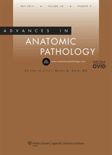
ADVANCES IN ANATOMIC PATHOLOGY
Leading the Charge in Anatomical Advancements.ADVANCES IN ANATOMIC PATHOLOGY is a leading peer-reviewed journal dedicated to the field of anatomical pathology, published by LIPPINCOTT WILLIAMS & WILKINS. With an impressive impact factor and consistent ranking in the Q1 category for both Anatomy and Pathology and Forensic Medicine, it serves as an essential resource for researchers, clinicians, and students alike. The journal has been a critical platform for disseminating significant findings and advancements in the discipline since its inception in 1996, boasting Scopus rankings of #1 in Anatomy and #11 in Pathology. While it does not provide open access, it maintains rigorous standards in the selection of articles, ensuring that published research reflects the latest developments and techniques in the field. As we look toward 2024 and beyond, ADVANCES IN ANATOMIC PATHOLOGY remains committed to advancing the science of pathology, fostering innovation, and enhancing clinical practice through impactful research.